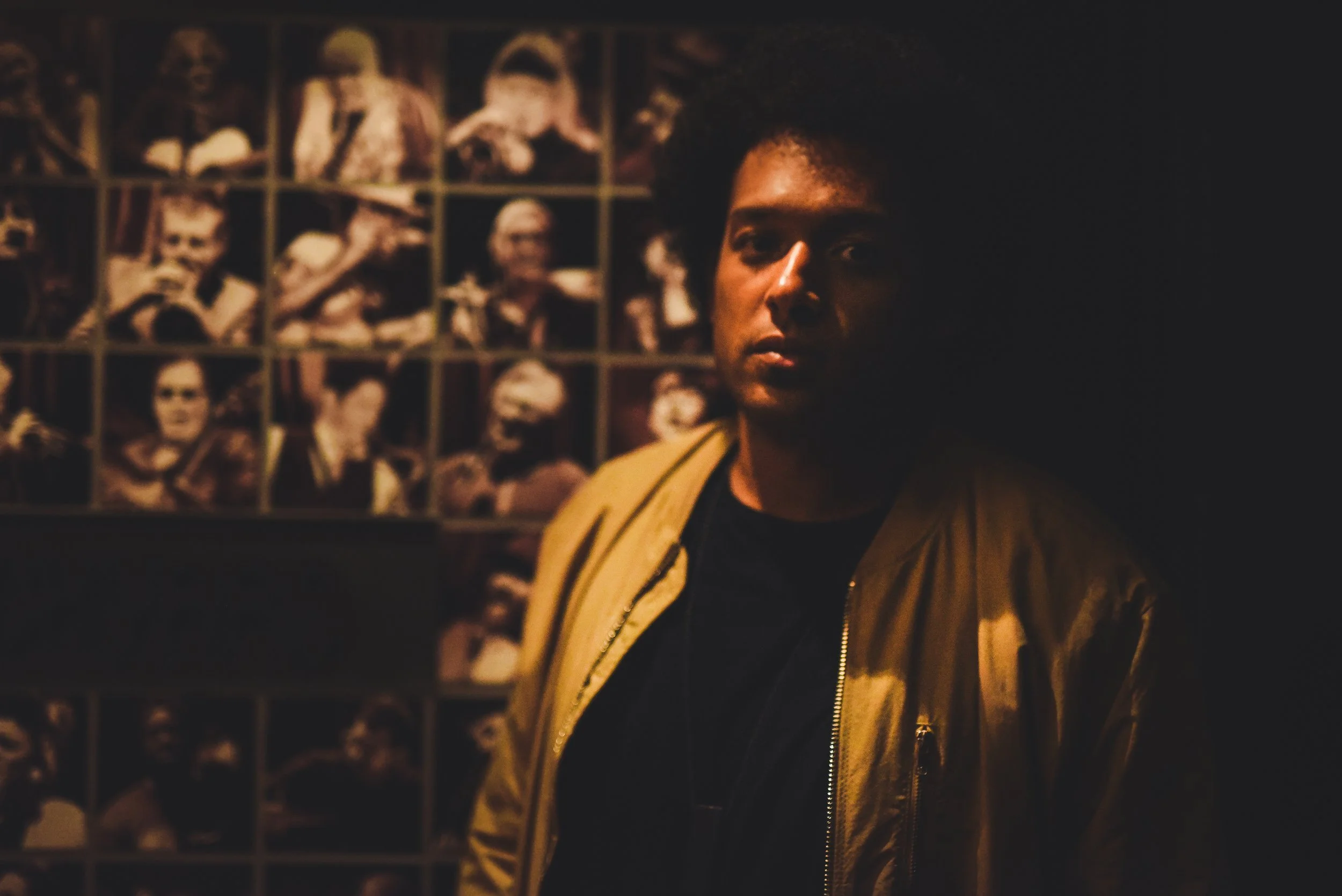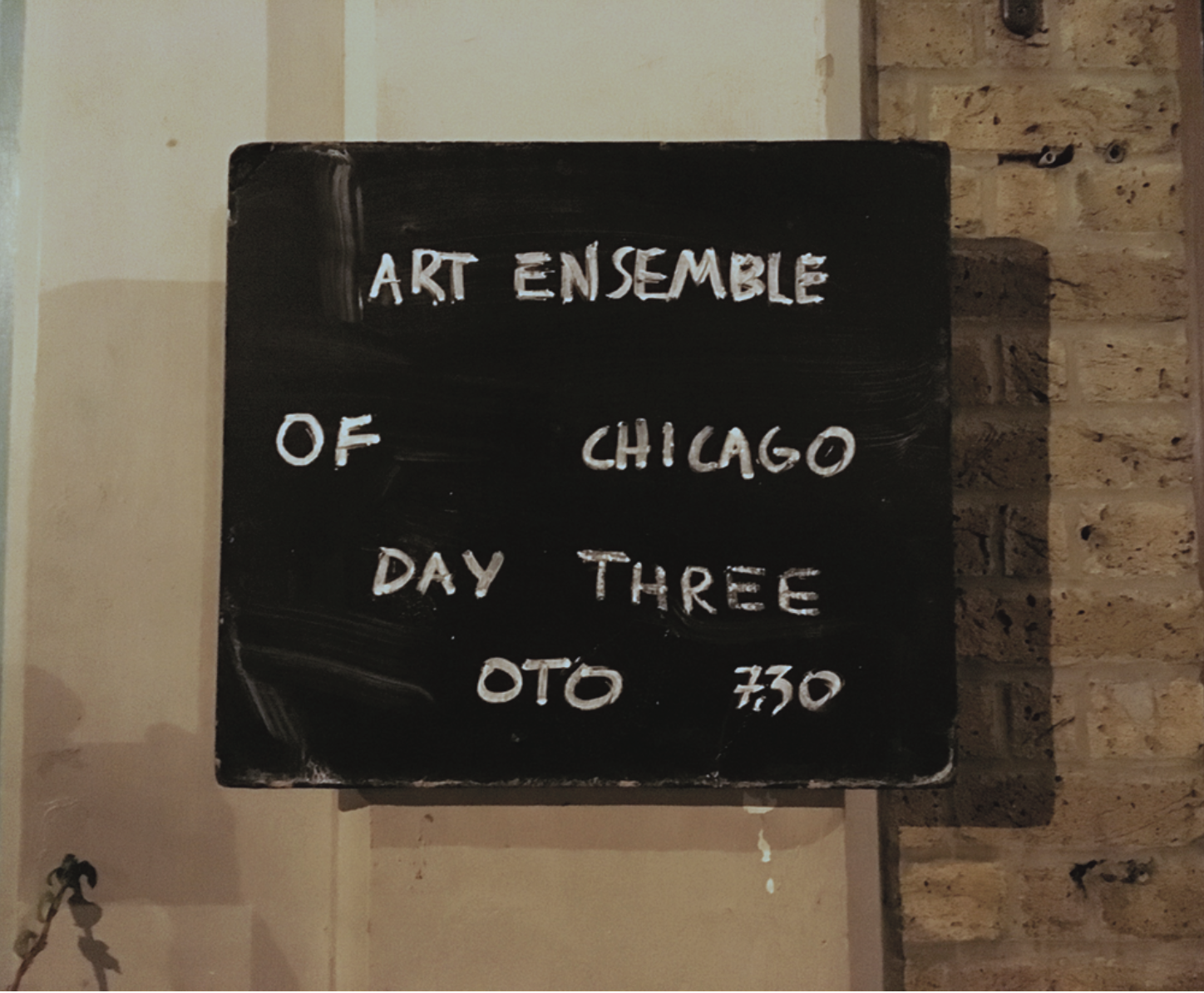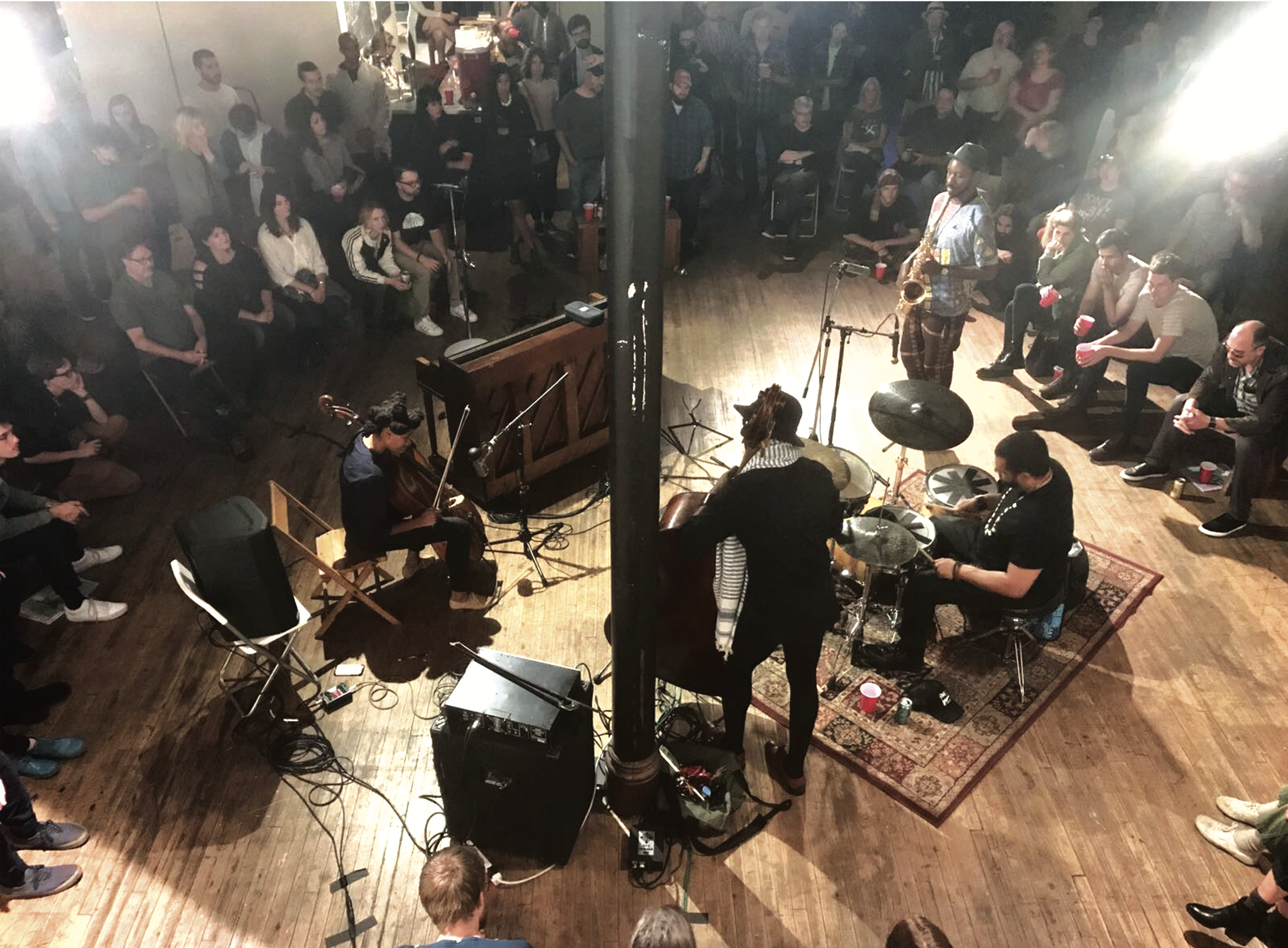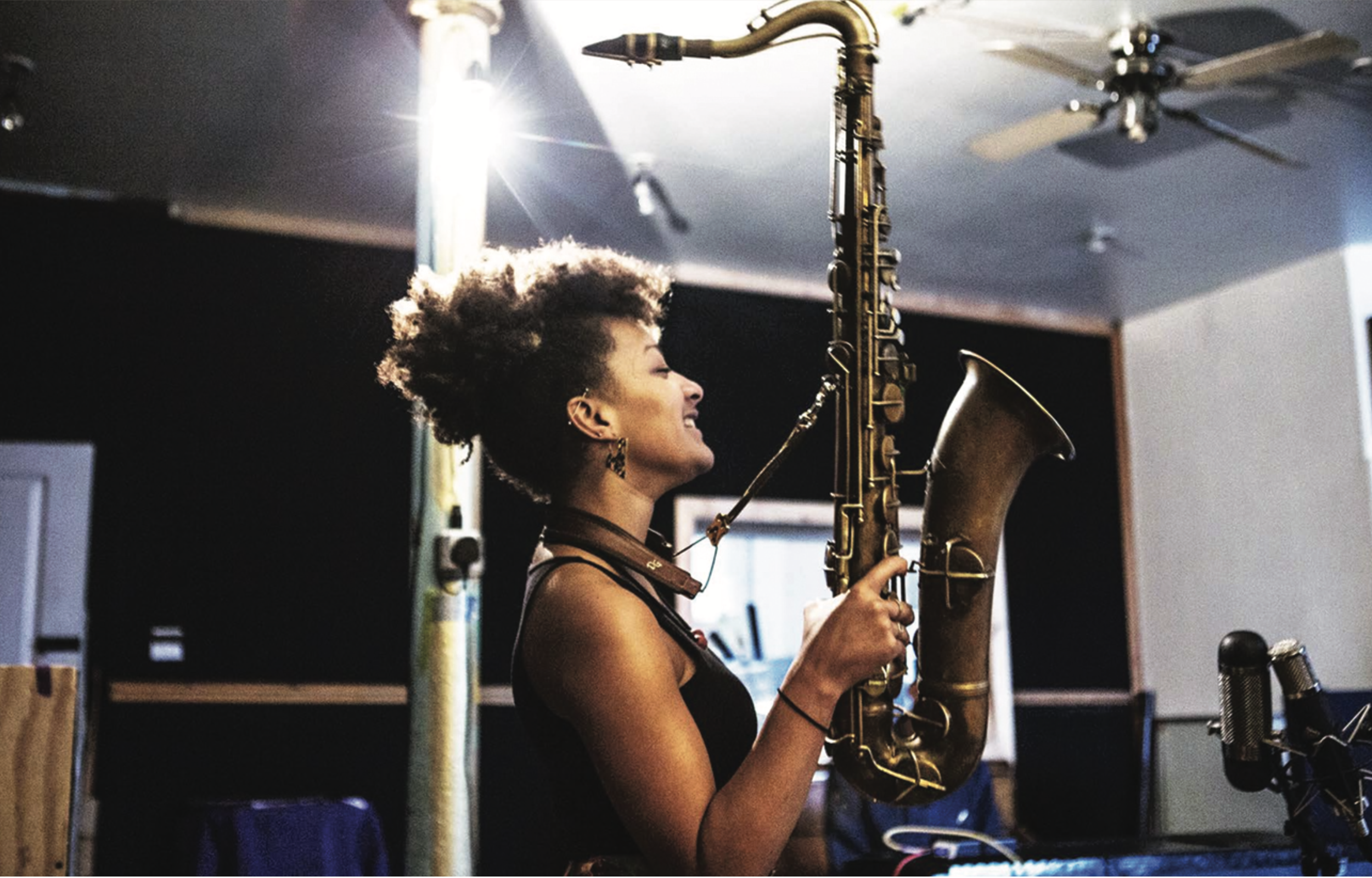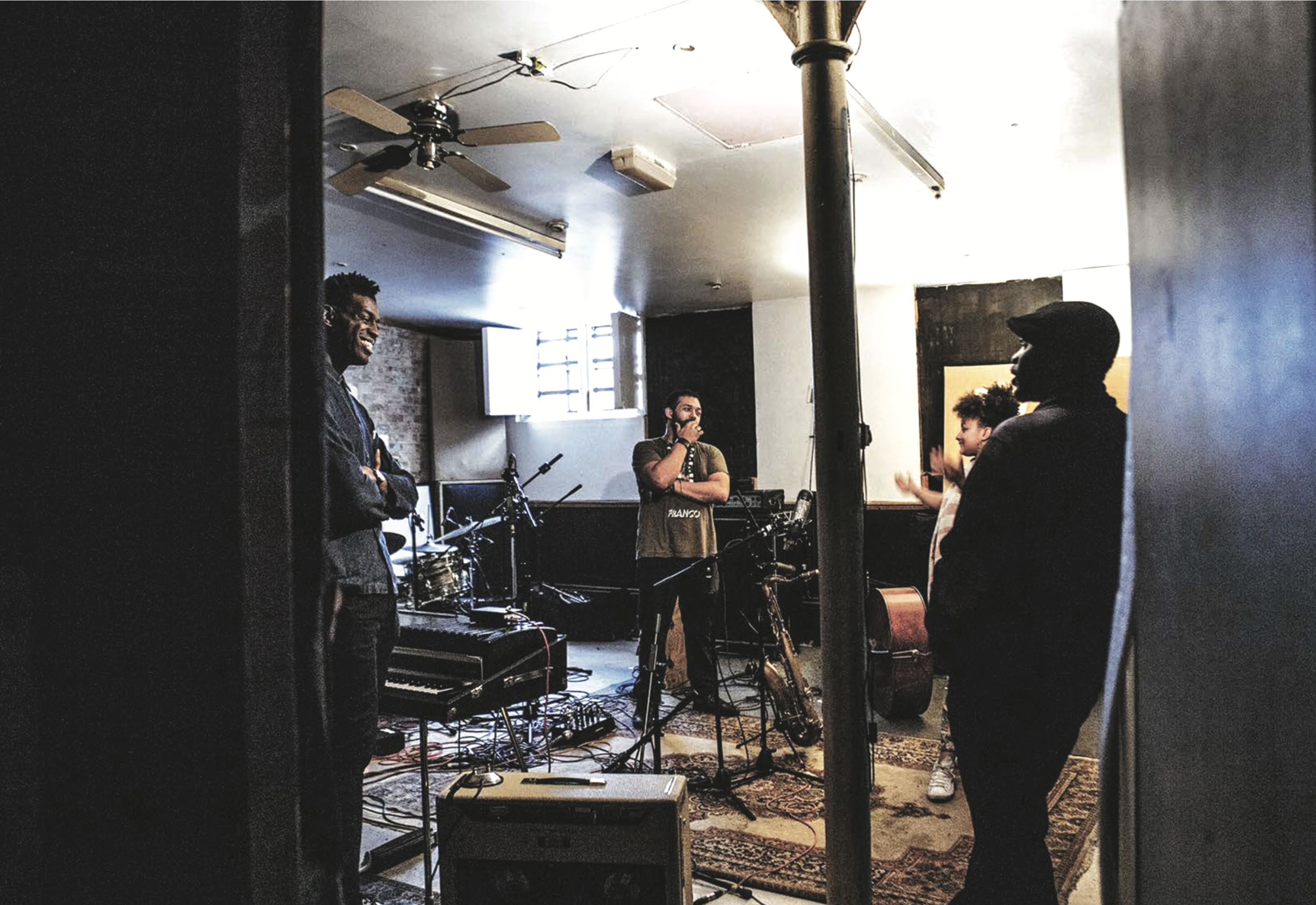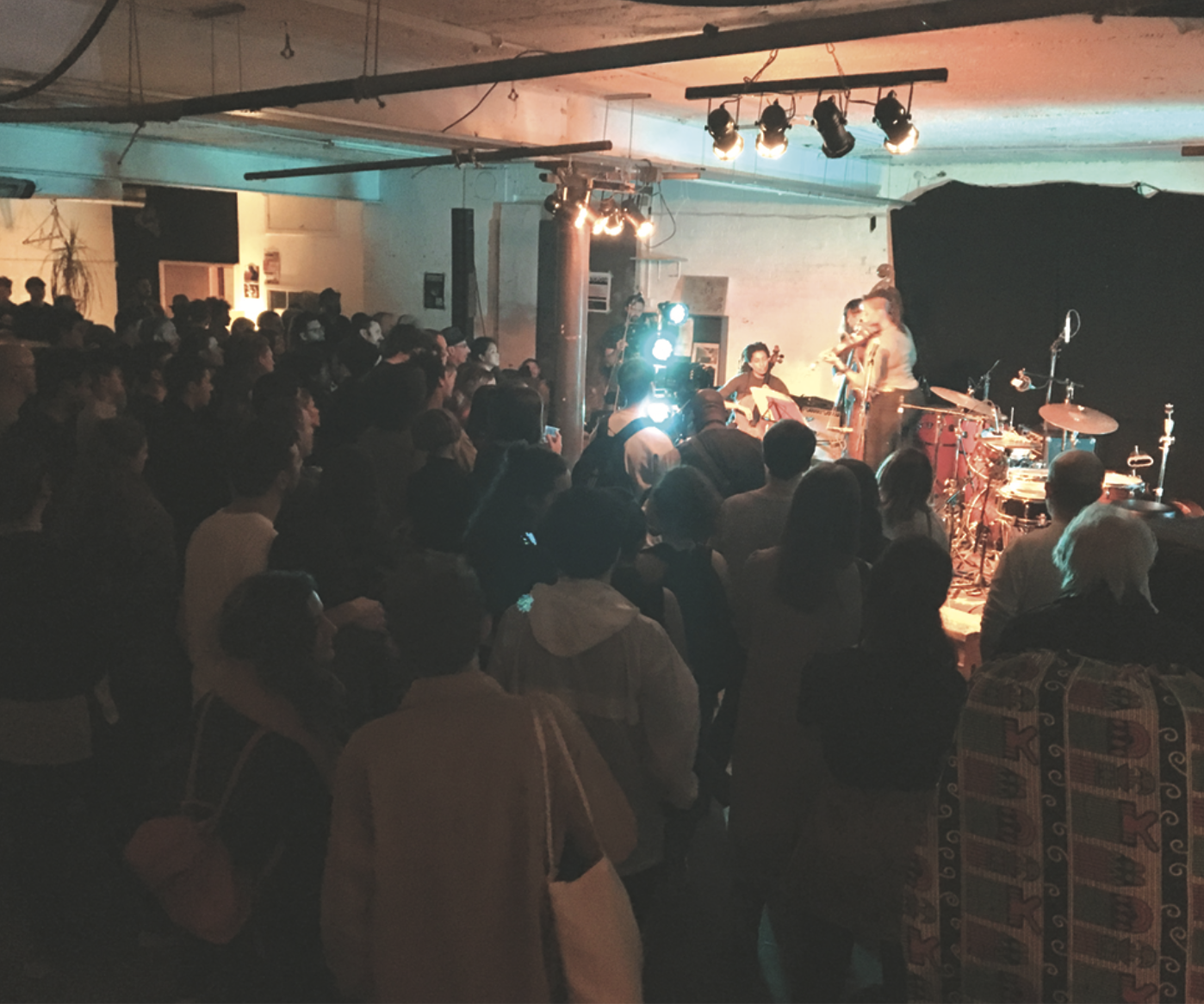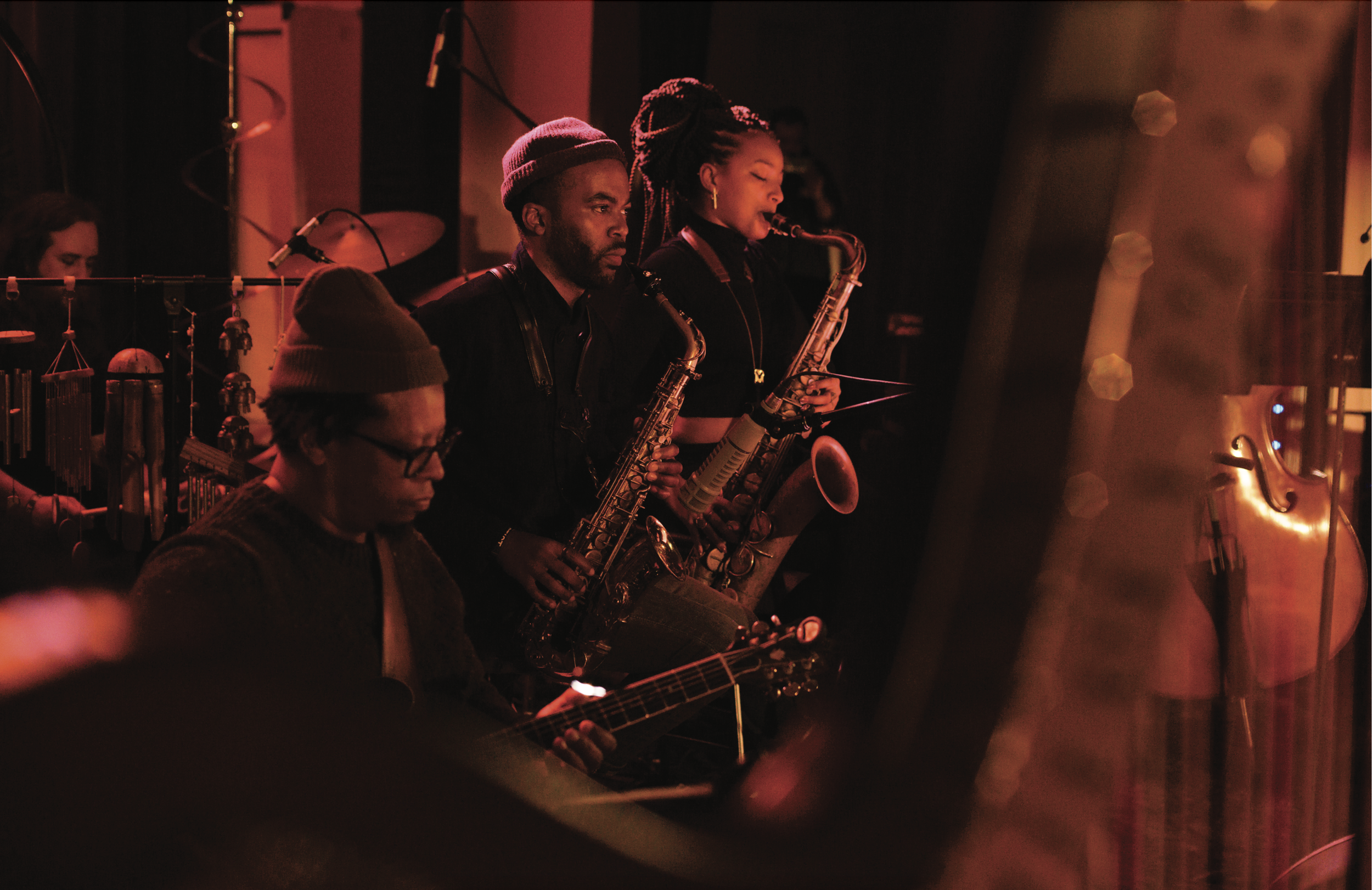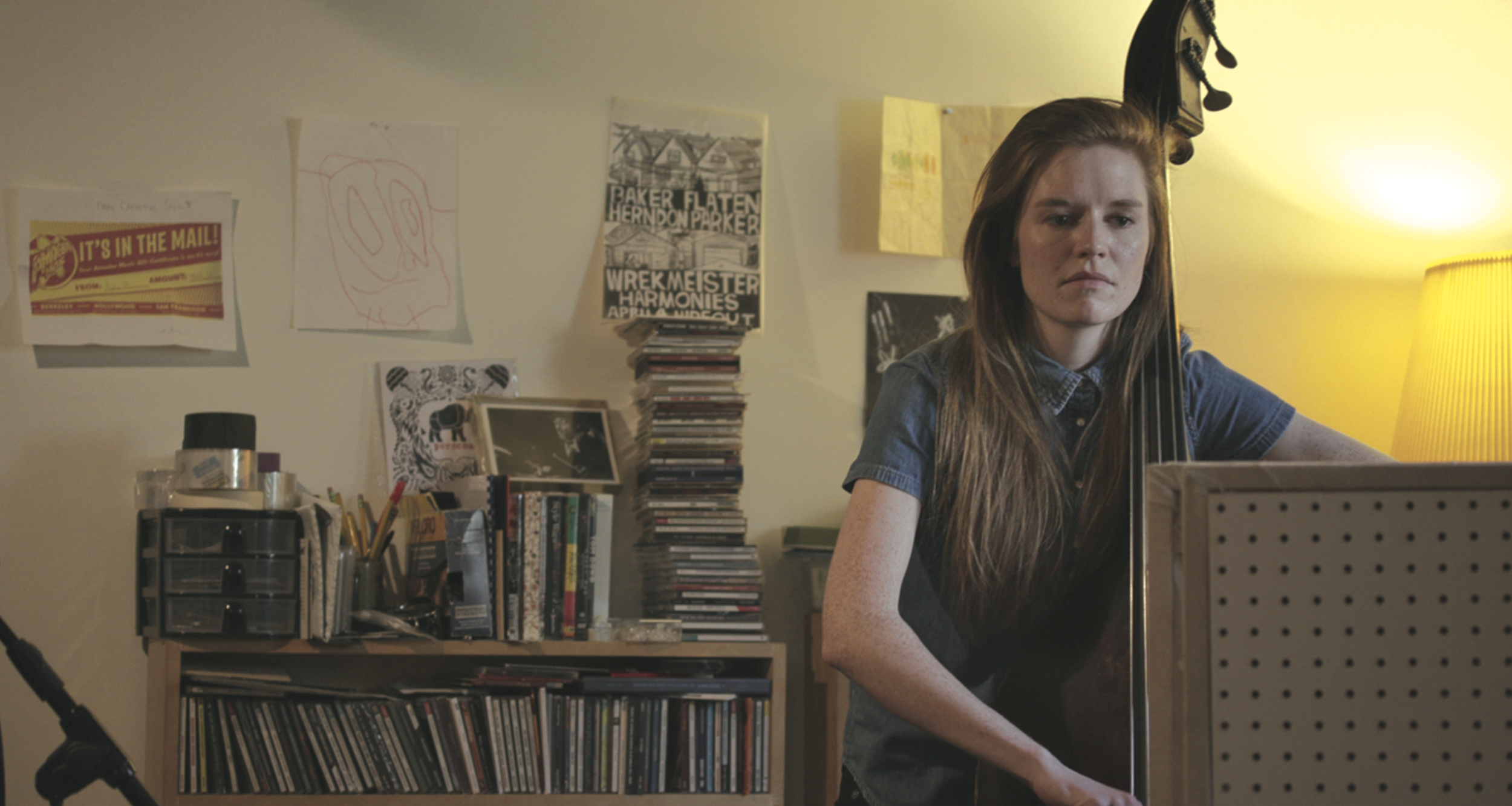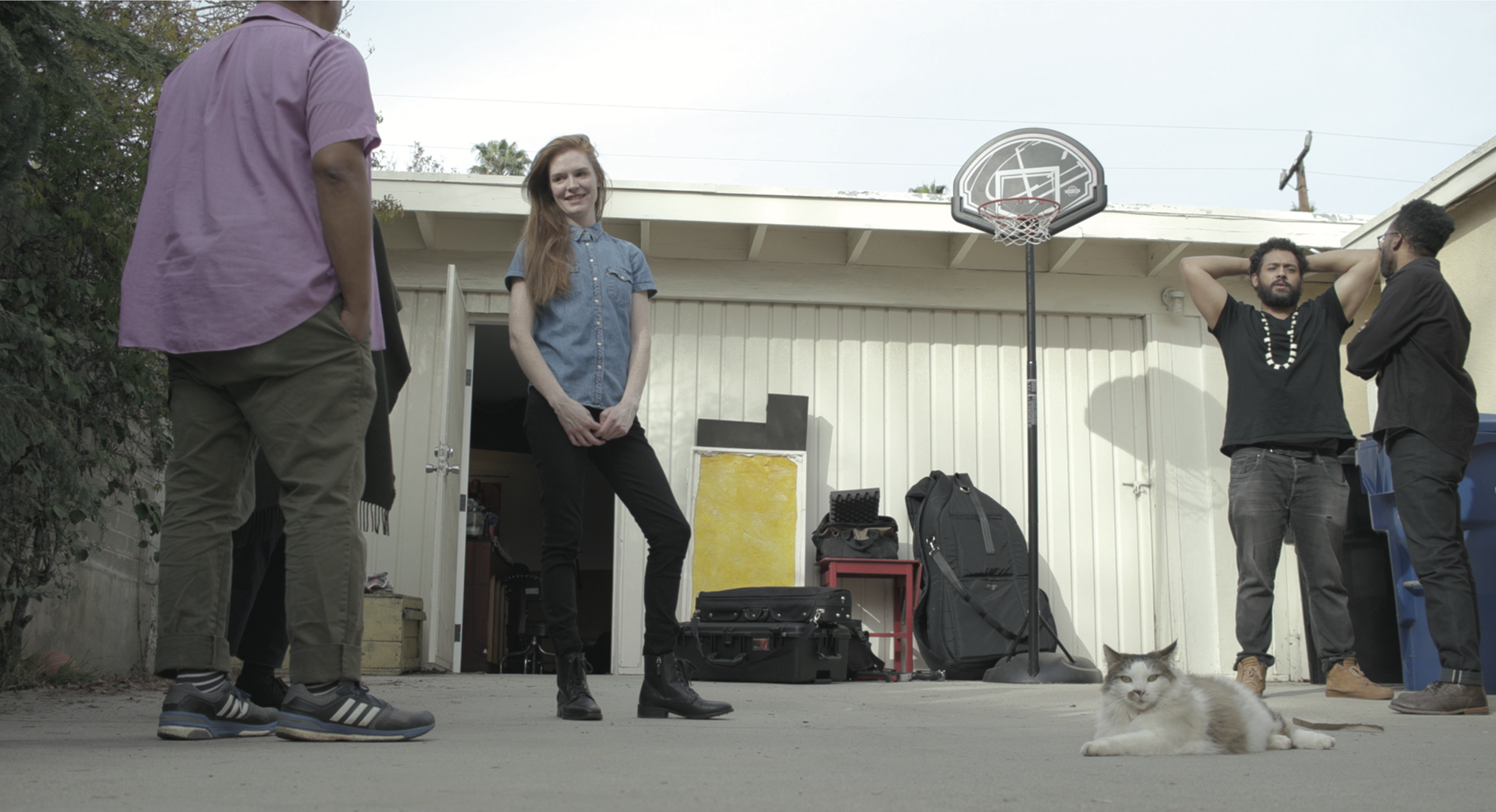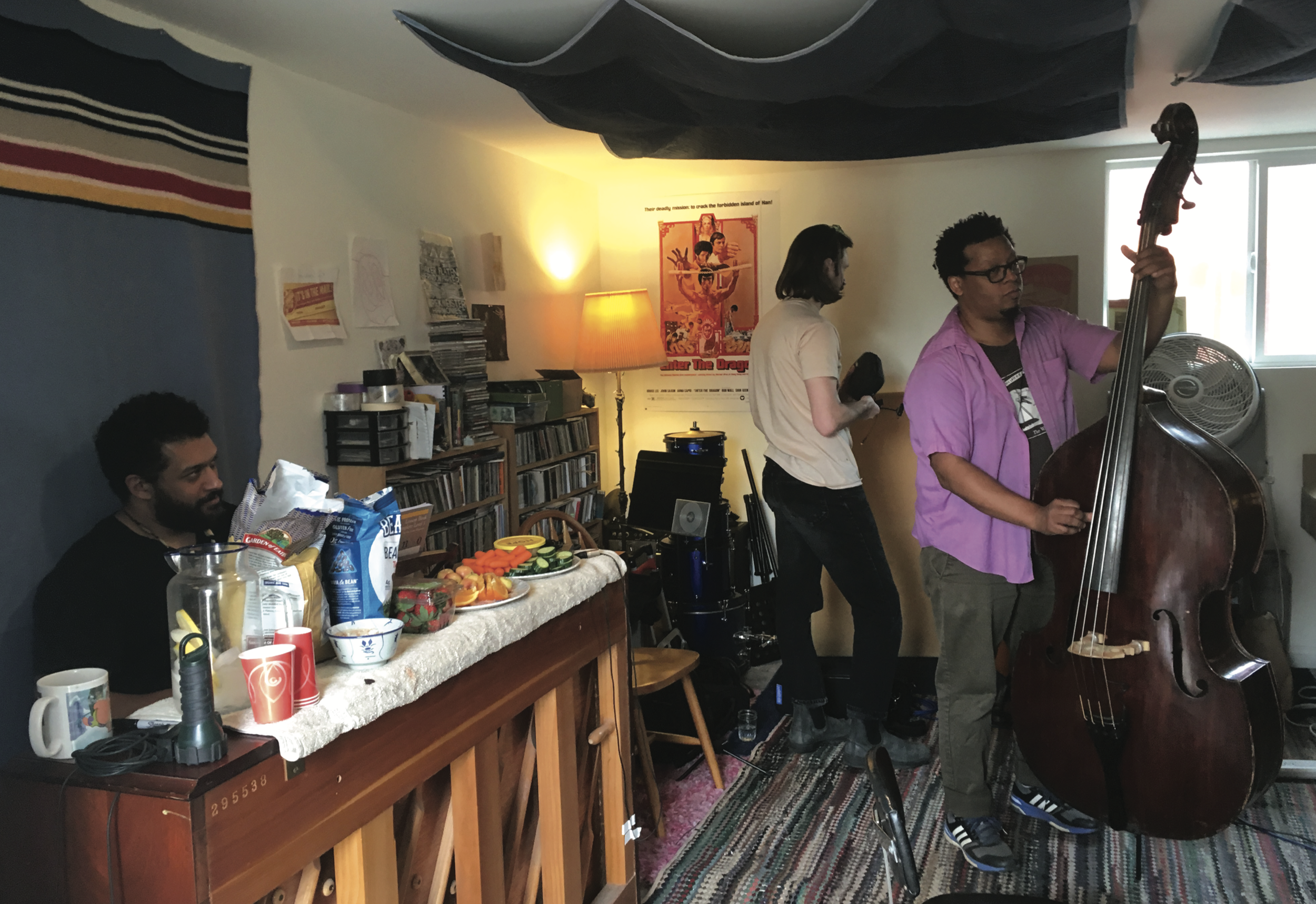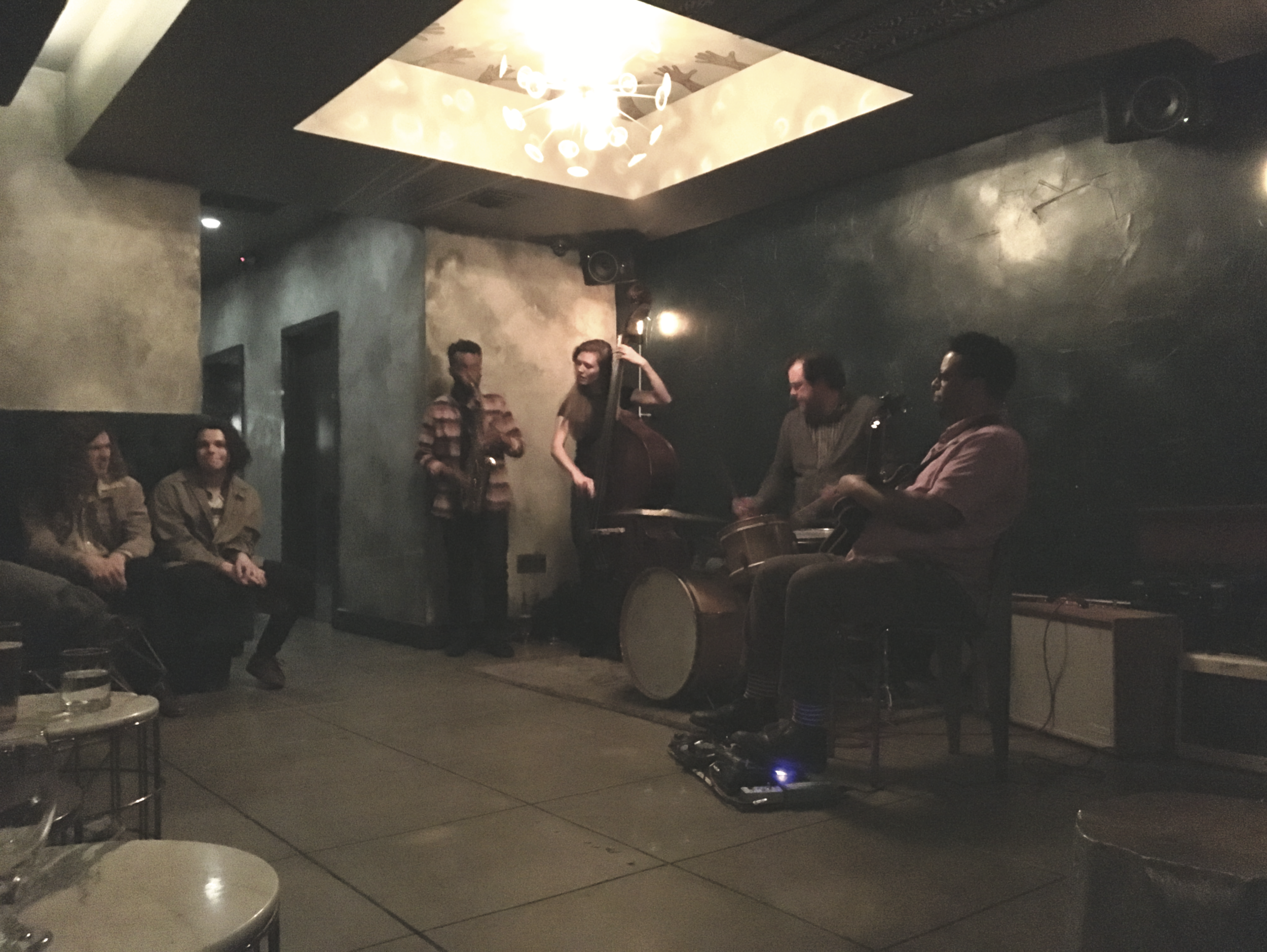International Anthem
The Eleventh Year
Makaya McCraven
Universal Beings
IA11 Edition
The 2018 release of Universal Beings, in many ways, feels like the moment that the gates swung open for both Makaya McCraven and International Anthem. On one hand, it's a four-sided communal showcase of the inter-city exchange that had started to develop in the “new jazz” hubs, collecting group improvisations from New York, London, Chicago, and Los Angeles. On the other, it is an editing and post-production masterclass – the MVP of McCraven’s “organic beat music” concept – and a landmark moment where his cut-splice-reassembly chops shine as brightly as the players themselves.
The musicians on the album were a combined who’s-who and who’s-gonna-be-who of their respective scenes: Brandee Younger (harp), Joel Ross (vibraphone), Tomeka Reid (cello), Dezron Douglas (double bass), Shabaka Hutchings (tenor saxophone), Junius Paul (double bass), Nubya Garcia (tenor saxophone), Ashley Henry (Rhodes piano), Daniel Casimir (double bass), Josh Johnson (alto saxophone), Miguel Atwood-Ferguson (violin), Jeff Parker (guitar), Anna Butterss (double bass), and Carlos Niño (percussion). In our original press release, we called it “an inspiring display of the organic global inter-connectedness of the Black American music tradition in 2018.” In our off-the-record conversations at the time, we said ‘it’s like Dr. Dre’s The Chronic, but for jazz’.
Universal Beings earned rave reviews across the board. It was a consensus year-end favorite (as seen in NPR Music, WIRE Magazine, New York Times, Chicago Tribune, LA Times, Rolling Stone, Vice, Stereogum, the list goes on…) that cemented McCraven as a must-buy album producer and a must-see live performer, and brought enough energy to our “plucky Chicago indie label” that we were able to move out of a closet and into an actual office.
The IA11 Edition of Universal Beings comes on classic black 140-gram vinyl 2xLP inside a heavyweight reverse-board jacket, with a 16-page 11x11" insert booklet (with unpublished photos and four conversations between IARC co-founder Scott McNiece and musicians Joel Ross, Junius Paul, Nubia Garcia, and Anna Butterss), IARC 2025 obi strip and printed poly-lined printed inner-sleeve. Pressed at Pallas in Germany, with lacquers cut by Daniel K at SST.
-
New York Side
Recorded August 29th, 2017, at H0l0 in Ridgewood, Queens, New York.
Brandee Younger – harp Tomeka Reid – cello
Joel Ross – vibraphone Dezron Douglas – double bass Makaya McCraven – drumsSpecial thanks: Joe Jeffers, Malik Abdul-Rahmaan, Alejandro Ayala, Elliot Ross and Hank Shocklee.
Chicago Side
Recorded September 2nd, 2017, at Co-Prosperity Sphere in Bridgeport, Chicago, Illinois.
Shabaka Hutchings – tenor saxophone Tomeka Reid – cello
Junius Paul – double bass, percussion Makaya McCraven – drumsSpecial thanks: Andy Dane, Rachel Millar, David Passick, Alejandro Ayala, Angel Bat Dawid, Alexander Hawkins, Ingrid Laubrock, Neil Gainer, David Chavez, Ed Marszewski, Jamie Trecker and Shanna Van Volt.
London Side
Recorded October 19th, 2017, at Total Refreshment Studios in Stoke Newington, London, UK.
Nubya Garcia – tenor saxophone Ashley Henry* – rhodes piano Daniel Casimir – double bass Makaya McCraven – drums
Special thanks: Kristian ‘Capitol K’ Robinson, Alexis Blondel, Tina Edwards, Will Savery, Mark Pallman and David Burkhart.
*Ashley Henry appears courtesy of Sony Music Entertainment UK Limited
Los Angeles Side
Recorded January 30th, 2018, at Jeff Parker’s house in Altadena, California.
Josh Johnson – alto saxophone Miguel Atwood-Ferguson – violin Jeff Parker – guitar
Anna Butterss – double bass Carlos Niño – percussionMakaya McCraven – drums
Special thanks: Lee Ann Schmitt and Ezra Lou ParkerSchmitt.
Recorded & Mixed by David Allen & Dave Vettraino.
Cover Art by Damon Locks.
Design by Aaron Lowell Denton.
Insert Cover Photo by Fabrice Bourgelle.Produced by Makaya McCraven. Executive Production by Scott McNiece.

FOUR
SIDES
of the story
Phone calls with four musicians, August 2025, by IARC co-founder Scott McNiece

Joel Ross at H010 in Queens, NY. Universal Beings ‘NewYork Side’ session, August 29th, 2017. Photo by Joe Mault
JOEL ROSS
New York Side
SM:What's the first thing that comes to your mind, about the session with Makaya at H010 in Queens, back in 2017?
JR: It was a really, impactful musical experience for me. I think that was the first completely improvised performance I had ever done, up to that point.
SM: Wow.
JR: Well definitely the first time for me, for an entire gig that was being recorded. Also, I think that was the first time I met and played with Brandee. Maybe also the first time I met Dez? I can't remember. But I was new to New York. Mak called the gig, and he said “come on, we're just gonna play.” If it wasn't the first, it was definitely one of the first, and certainly the most impactful, completely improvised musical experience I’d had. I think after that, all of my improvised musical moments have in some way been attempting to recreate, or have been certainly inspired by what we did there, and how Makaya took it and shaped it into something else for the record.
SM: Damn. That's heavy praise.
Joel Ross, Chicago native, before sound check at Universal Beings album release show, Le Poisson Rouge, NewYork, NY, December 2nd, 2018. Photo by Scott McNiece.

JR:Yeah, that's what I'm talking about. It's cool that it was a spot where folks like that came to hear this music.
SM: And what about the music? One of the things that I remember was that Tomeka showed up late. She was coming back from a gig in Connecticut, and she only ended up playing the second set. Can you remember anything about what it was like, inside the music? If it’s your first time playing fully improvised in performance... you're also improvising with a harp, which isn't the easiest instrument to improvise with, right?
JR: For me, it was nice playing with the harp. Getting used to how Brandee interprets music, because Mak and Dez, from a rhythm section perspective, were able and used to laying down a strong foundation. And I felt like between myself and Brandee – well only really speaking for myself, but knowing Brandee now at this point – we were listening hard and searching. At least for me in that situation, I didn't really know what to do, so I just tried to listen and create a layer that works. I think from what I was doing, Brandee would then figure out her thing, then I would support. Everything we did, I believe, was built in that manner. So it required trusting everybody there, and trusting myself. Mak still tells me this to this day, my tendency was to play less but he definitely wanted me to play more, to step out and take a solo as well. Even if it's all improvised, that part of the music still exists. So that was an important learning moment for me.
Ensemble view, from next to Makaya’s drumkit at H010. Photo by Scott McNiece.
JR:Yeah, but it was, really. If you ask Mak, now anytime he asks me “what are we going to play?” I'm always like, man, we should just improvise again. Because it was killer.
SM: Man, I was there too. It was definitely killing. So you had just moved to New York?
JR: I'm pretty sure, yeah. This was August of 2017, so I was like a year in.
SM: And you're from Chicago, right?
JR:Yeah, I'm from Chicago.
SM: Can you remember anything specifically about the gig? The space, the people that were there?
JR:Yeah, it was definitely the load-in, the loadout... it was a non-J venue. If I'm remembering right, it was like a warehouse vibe, or something. One of those spaces you see a dance party or a rave happening in a movie, like flashing lights, that's what it felt like. It was definitely not your Birdland or your everyday jazz club.Which I've now experienced with Mak, a lot. It was cool to be out of a traditional space that presents jazz and be somewhere where there were younger folk, different types of people in the audience that come to hear that music.
SM: Man, speaking of the audience, some of the people I remember being there... Hank Shocklee from Public Enemy came by. That was pretty sweet. Also, I don't know if you know that cat Soil Pimp, the wine guy, who used to hang with Madlib a bunch. He was there and I think that was his first experience seeing Makaya live – probably seeing any of you guys live, honestly – and he was super into it.

BrandeeYounger at H010, viewed from behind one of the many obstructive pillars. Photo by Joe Mault
SM: I was just looking back at some footage from it the other day. When you came up on the screen I was like, oh my god, Joel looks so young!Your hair was so short. I forgot about how young you were. How old are you now?
JR: I just turned 30 this year.
SM: So you were 22 at this session then? JR:Yeah, I had to be.
SM:That's amazing.Yeah, everyone was so excited about you back then. I remember Marquis [Hill] was calling you “TheYoung Genius.” That was how he introduced you at his shows. Makaya actually named a track on this album “Young Genius.” Do you remember when Marquis started calling you that?
JR:Yeah, maybe one of my first gigs when I started playing with him, at the [Jazz] Showcase in Chicago. Which was, if not the same year as this Universal Beings session, maybe the year before.
SM: So I guess there was a lot of pressure then haha. He just busted it out on the bandstand, “this guy's a young genius.” That's so funny.
JR: I didn't think of myself that way, but I appreciated the love being shown that way.
SM: Another one of the track titles on that part of the album, Makaya called “Mantra.” That improvisation you guys were doing together was certainly very mantric, to my ears. Everyone was in this very minimal space.Very groove, rhythm centered. Really repetitive, minimalist vibe. Do you think that had to do with the harmonic limitations of playing free with a harp?
JR: I would honestly, probably say it was related to us wanting to play it safe.
SM:Well, that safety led to some beautiful music. One of the most important recordings of my whole life, as a music listener, probably.

Junius Paul at Co-Prosperity Sphere in Chicago, IL. Universal Beings ‘Chicago Side’ session, September 2nd, 2017. Photo by Mark Pallman.
JUNIUS PAUL
Chicago Side
SM: Check, check. Hello. All right. So, yeah, we're doing this anniversary reissue of Universal Beings. What Makaya and I talked about for the liner notes was asking one musician from each session to share some memories. As you know, you were on the Chicago Side, which we recorded at Co-Prosperity Sphere in September 2017. You, Makaya, Shabaka, and Tomeka. What are some things you remember about that session?
JP: Actually, to be honest, one of my favorite memories from that session, aside from the music, obviously, was the photos. There's an overhead photo that somebody took from up top, from the mezzanine section of Co-Prosperity, and it's one of my favorite photos ever. Because it really encapsulated the feeling of being there. I mean, there's a lot of photos of a lot of performances, thousands at this point. But that photo, I'll send it to you so you can just have a reference of it. I'm sure you're familiar with the photo, but I'll send it to you. It just really encapsulates that night, how the band was situated. I remember what I was wearing that night. I really do for real. And, you know, with Tomeka there, and Shabaka, and how the people were situated, with the lighting of the photo, and everything... Every time I look at that photo, it really brings me back to that night. Maybe even more than the record, to be honest with you. The record does too... but with the record, you know, Makaya did his editing thing. He did his magic on it, so it became a little bit of a different thing. But that photo is the one that really takes me back to the real improvisational nature of things from that night.
SM:Was that the first time you played with Shabaka?
JP:Yes. At that point, that was the first time. With Makaya, we’ve had Shabaka in on our set a few times now, and I've even played in Shabaka's bands since then. So, obviously all that has changed, but, yes, the Universal Beings session at Co-Prosperity was my first time playing with Shabaka.
SM: I remember... for me, that was such an exciting time. I remember it was the weekend of the Chicago Jazz Festival, and that was why Shabaka was in town. He came over to play with Louis Maholo. Of course you’d played with Tomeka here and there for a very long time, through the Chicago scene and the AACM... But I remember that was a particularly exciting time because you had recently joined the Art Ensemble of Chicago.You and Tomeka both, and you were getting ready to play together in London with the Art Ensemble, around a month after that.
JP:Yes, at Cafe Oto.
SM: I just wanted to bring that up because I was thinking about the specialness of all those intersections.Tomeka and you joining the Art Ensemble, getting ready to head London with the Art Ensemble, and then playing with Shabaka (who eventually did some things with the Art Ensemble) on this session in Chicago...
Junius Paul,Tomeka Reid, with the Art Ensemble of Chicago, viewed through the glass from outside Cafe Oto, London UK, October 17th, 2017. Photos by Scott McNiece

JP: I forgot about that aspect of it actually, Scottie, as far as the Art Ensemble. I guess now I’m coming up on 10 years with the Art Ensemble too. Well, not next year... 2027, but still that is crazy to me. I'm glad we're having this conversation because it does take me back to that time. I don't really think about it much because I'm constantly trying to just, you know, move forward, do things in the now, and try to keep up with that, which is a whole thing. But, yeah, thinking back on that time, there was a freshness there.Was that Makaya’s second International Anthem record?
SM:Well, it ended up being his fourth, but at the time of the Co-Prosperity show in September 2017, we had only released In The Moment by that point.
JP: A big reason that was a special time, to be honest with you, was because there was a special bond that International Anthem, myself and anybody that was involved with IARC had with Co-Prosperity.There was a certain kind of magic in that room at the time. Not just the night of this Universal Beings session, but there were multiple things that I did there then. Even up to the last time I was there, maybe like a year and a half ago, when I was doing the thing with M’Reld Green and Alabaster DePlume. The magic was there. But back in 2017-2018, there was just a certain thing in that room.You remember my quartet did a thing there not long after this Universal Beings session... we recorded and it ended up on my album Ism. I loved how we would set up on the floor of the space, and people would just gather around. People would be seated on the floor, or standing up, or seated on those benches.There was just a certain intimacy with the people in that particular room. And that night, there was a different kind of feeling in the air because Shabaka was in town, and that lineup... with Makaya, Shabaka, and Tomeka, there was just an anticipation in the room that night.
SM:Yeah, I remember the anticipation, it was a big feeling. I also remember having breakfast with Shabaka the next morning and he told me ‘oh, yeah, I just signed to Impulse Records,’ and I was like Impulse? I didn't know that was a label anymore. And he said ‘yeah, they’re relaunching the label’. Thinking about the energy of that time... you and Tomeka had just joined the Art Ensemble of Chicago, Impulse Records is relaunching with Shakaka... all of a sudden it was starting to become clear to me, after many years of trying to push our way out of obscurity, working with you guys and your music, that all of sudden we were in the middle of this thing that is on the cusp. And it was about to be a whole new chapter.
JP: And Makaya had a whole buzz going on too, that was still really strong from In The Moment. And when you think about Joel Ross - who ironically was on the New York session, even though he's from Chicago... I know we're talking about the Chicago session, but you might remember, this was also a time when Joel was on the rise as well. So there's a bunch of musicians on Universal Beings that were really in a certain type of phase. I had only just started playing with the Art Ensemble and it was pre-Ism...
SM: But if you remember, we had actually already started working on Ism though.
JP: Right, right.
Tomeka Reid, Junius Paul, Shabaka Hutchings, Makaya McCraven, in the round at Co-Prosperity. Photo by Scott McNiece.

SM:We started working on Ism in May or June of 2016. By the time of Universal Beings, we were in the middle of that long, two-year stretch of figuring out how the hell to finish it haha.
JP: Exactly. So we had started that work, but the album hadn't dropped yet, so... my thing was on the rise through playing with other musicians but my personal music hadn't really jumped off like that yet. So thinking about it, it was a different time because it was right before the thing broke, for so many of us.
SM: That’s what I’m saying! It felt like all these things were about to break. Things were on the cusp.
JP: It was part of the beginning of a period of resurgence of young ears being tuned in to jazz.
SM:Yep.These days it's kind of like... that goes without saying. That's one of the things I love about where this music has gotten.You don't even have to say that anymore. Jazz seems to have been fully integrated into the broader conversation about music, in general, you know?
JP: It has, it has. But back then, it was still kind of in that relegated space a little bit.You know what I mean? I feel like Universal Beings is one of the quintessential records of that renaissance.
SM: Well, obviously, you’re preaching to the choir there haha. But yes, I agree with you!
JP:Yeah, Universal Beings is one of the central records of this thing that we're talking about as far as young jazz audiences, young jazz ears, young jazz musicians... but also roping in the elders.You know what I mean? Like, we were roping in the elders at the same time. They were like ‘yo, who are these young motherfuckers out here playing? Yo, these young cats are playing... they're not bullshitting’.
SM: Right! Haha.Well, let’s try to take it back to the night of the session... Can you think of any other memories from that night that are more personal? Anything about the music you all were playing that comes to mind?
JP:Yeah, I remember that when we first started, it took us a second... like we didn't start just crazy intense. It took us a minute. Actually, well, let me think, did we?
SM: That’s how I remember it. And I remember wondering why, for a couple of reasons... just the acoustics of Co-Prosperity, first of all. I remember watching you guys start making sound, you were playing a little open, a little more avant-garde, and I was wondering if that was going to last.You know, Shabaka, at that point, was notorious for his super high octane playing... so I was wondering when and how that was going to happen. Again, it was that really strong feeling of anticipation we all had that night. But I really wonder if that slow start was because of the acoustics of the room. I mean, any recording that was captured at Co-Pro, including stuff from your record and other records we've done.. the room is so open with such high ceilings, so you hear the effect it has on the way the music’s made.
Tomeka Reid and Shabaka Hutchings, from behind Junius’s bass amp at Co-Prosperity. Photo by Sean Owens.
JP:Yeah, absolutely, it very well could have been the echo in the room that led to us starting out the way we did, really open and explorative... not necessarily getting into vamps off the bat, but exploring more textures and sounds, combinations of sounds...That's something I can say I learned from playing with Roscoe [Mitchell], even before I was playing with the Art Ensemble... textural playing. So a lot of the things that I was learning, playing with Roscoe, I was able to really implement into what was going on that night. And I think that that's where it all kind of ties together with the experience that I was accumulating with Roscoe and with Don Moye... I was able to really implement those things for our set at Co-Pro. And to be clear, some of those things are about space, and not playing. Something that Roscoe says all the time is “silence is your friend.” Understanding that concept, that sometimes your contribution comes from being silent and letting other colors develop. So when you step back in, you can contribute in a different kind of way. But I definitely remember starting out in a very spatial kind of energy, and I remember thinking at the time how beautiful Shabaka sounded in that space. Before that night, I had only heard Shabaka play with the Ancestors and Sons of Kemet. I had come across those bands while on tour with Makaya. I knew that Shabaka was very versed in a lot of different things, but to hear him play in this manner was really really beautiful. I wouldn't say it was surprising. It wasn't surprising at all, but it was just really beautiful to hear him play these textures. And that's more in line with what he does now, right?
SM: Right! Maybe you guys had an influence on that.
JP: Maybe.
SM:Yeah, it's really great you are reminding me that such a huge portion of the session was that sort of textural improvisation. Because it really differs from what's heard on the final record... Makaya took specifically the groove parts of the set and worked with those. So when you listen to the Chicago side of Universal Beings, you're mostly hearing Makaya taking the moments where there was a really driving groove and emphasizing those moments. Maybe someday the world can hear the full original recording, and hear how many different dimensions you guys explored that night.
JP:Yeah, we got into a lot of different things and it wasn't just like we went straight from textures to grooves and stayed there.We kind of went back to some textural stuff as well. It wasn't just from one thing to the other and that was the night, no. We would hit a groove for a while and then get back into some textures and kind of find our way into another groove again and then find some more textures. The textures, the groove, they went hand in hand. Those more open moments really helped to create the foundations of the grooves. And when those grooves broke apart, we would coalesce around some of the lingering textures. I think the beauty of that night was that everybody was open to finding what was next. Or maybe, actually, finding the now, and not even thinking about ‘what are we going to do next’. It's not like it was a set list or something. It was really just like a bunch of beautiful moments of being in the present, being on the edge, and being in the now.
SM: Man, you guys did it so well that night, too. I remember Shabaka around the end of 2017, he posted a short clip from the Co-Prosperity session, this set... and his caption was something like ‘this was one of my favorite sessions from this year’. I remember thinking, wow, I didn't realize he was that into the music that night!
JP:Yeah, that's beautiful, man. I think everyone involved knew that it was something special when it happened.

Nubya Garcia at Total Refreshment Centre. Universal Beings ‘London Side’ session, October 19th, 2017. Photo by Fabrice Bourgelle
NUBYA GARCIA
London Side
SM: Where are you at?
NG: I'm just in a writing studio, I've just got it for a few days a week for the next couple months while I'm in and out of town. Just to supplement my home studio with a different space, that seems to work well for me.
SM:Yeah, I do know. I'm currently in a space that I came to in order to get out of my house. I know exactly the vibe.You’re in London, yeah?
NG:Yeah. I'm in London, in Hackney right now.
SM: Cool. So just to reiterate... for these liner notes, we're just hoping to share just some first person perspective from you about the London session. Which as you hopefully remember, was in the upstairs studio at Total Refreshment Centre.
NG:Yes, I do remember.
SM:What’s the first thing that comes to your mind?
NG: The first thing that comes to my mind... I feel like there was just a really interesting and beautiful synergy. I don't think Dan and Makaya, or Makaya and Ashley, had played together before. And even still, it was a real calm meeting of minds. I felt like I slotted in there quite well having played with Dan loads. But yeah, I remember we weren't sure what was going to happen or when.We just played and played and played. I think synergy is the word that comes to mind. Watching what Makaya did in the moment, and then hearing what he did creating those tunes out of what we played that day.... TRC just had a lot of music come through its doors, and that studio was particularly special, which helped make it a really special day.
SM: In all fairness... I think you said it was the first time for Dan and Ashley to play with Makaya, but I'm 99.9% sure it was also your first time playing with Makaya.
NG:Yeah, I was trying to remember if the gig we played was before that, or after.
SM: Well, it was the same day as the gig that you played with Makaya, Theon [Cross] and Joe [Armon-Jones]. The studio session was in the afternoon, upstairs at TRC, and later that night was the gig downstairs in TRC’s old venue space.
NG: And we really never played together before? OK fair.Well, then it was all of our first times playing with Makaya. And also, like, yeah, just even now remembering that, it changes because I would have probably been even moreso wondering what was going to happen. I had listened to his music for years beforehand. “The Jaunt” and stuff off of In The Moment. So, yeah, I'm sure there was a fair bit of real excitement to have been called for the session. I didn’t know what we were going to do, and that was fine. Vibes. I remember, I don't think we stopped for a while.We were playing and playing.
SM: I remember in that studio at TRC, you guys were all set up in the same room. I don't know how often you record like that.
NG: All the time, all the time. That was the only way that I could afford to record before that, you know. Studios with one room, maybe one booth. But in jazz recordings it’s pretty commonplace to do a room sound. And it gets really beautiful moments. I think we were all very comfortable with that, and it also makes for a different performance in terms of how you connect with each other. Especially if you don't know each other... Just being able to look in each other's eyes and vibe each other, encourage each other, and say ‘yeah man that's cool, keep doing that’ with your eyes, you know? And to hear each other, of course. Sometimes you've got cans or headphones, but to feel the sound in the room... Makaya is such a visceral player. Like, you can feel and hear what he's doing. I would actually say the same about most of us in that session, I would like to think. I know Dan definitely does that, and Ashley too.We're in the moment. That's what it felt like: really firmly in the moment, and catching everything. Trying to, anyway.
SM: The recording, as mentioned, happened at Total Refreshment Centre during the day. And then later that night, you played again with Makaya, Theon and Joe. And that was the second day of this two-day residency we did at TRC. We didn't know before then, but we definitely realized when we got there that it was kind of a hub for a lot of musicians on the London scene. A lot of shows were happening, it seemed like a lot of people were doing a lot of stuff there. What do you remember about Total Refreshment Centre from around that time? That is, October of 2017.
Ashley Henry, Makaya McCraven, Daniel Casimir, Nubya Garcia take a break.View from the doorway into the live room of Total Refreshment Studios. Photo by Fabrice Bourgelle
NG:Wow...That's a long time ago, Scottie. Not 2017. It can't have been...Well... what do I remember about that time? I mean, big question, because I feel like I was there several times a week. Playing shows, seeing shows, just being there. Things were happening all over London, but that was definitely, as you said, like a hub and it had lots of different spaces, which is what I think contributes to a successful community space. It had the upstairs... The first time I went, it was just upstairs and smaller and it had the bar area. And then they opened up and expanded into the downstairs where we had the gig with Makaya, Theon and Joe. Then the garden area opened up, and the patio... That always makes a space great, I think, when you can dip in and out. But yeah, I just remember there being loads of different types of gigs, like anything felt welcome there, and it felt like a real space where we could do our thing. I remember Shabaka doing loads of gigs with loads of different bands and putting together bands for a night – oftentimes like a one time thing, you see it and then it never happens again. Which I suppose is kind of what happened with the gig that Makaya had in the evening after our session.
NG: Now I remember... we were taking a break during the recording session, when Makaya invited me to play that night. I originally wasn't meant to be on that gig. He was like ‘what are you doing tonight, maybe you can come down?’ And I was like: Are you being real? Are you sure? He said ‘I'd love it, if you're down!’ And I was like: What kind of thing would we be doing? ‘Same kind of thing. Improvising.’ Cool. And I believe it was his birthday!
SM:Yes, it was!
NG:Yeah, yeah, yeah. He was just... he's just a great innovator, and someone that really stands in between understanding the jazz tradition and also loving dance music in all its forms. There's a real link up between Black musicians from Chicago and Black musicians from London, specifically.There's always a hook up because you understand the intricacies of multiple inspirations.Those inspirations are denominations of dance music, in varying forms, and that comes out in quite a lot of Londoners, in our playing. I would say I hear that in players like Makaya. Anyway, yeah, we did the gig, came through, it was fucking fire and it was really fun. It felt really electric, and the crowd were ready. That's one thing about TRC that I will say, like, it had a really, really incredible audience that were up for whatever they were going to see, you know. Whether that was an ambient, meditative two-hour gig, or a hit-it-and-quit-it hour set from, I don't know, my band or Theon’s trio, or what we did with Makaya..You know?
SM:Yes. 100%.That is a big thing I remember about being there for the first time. Just being so inspired by the audience and the community there. I felt like everyone was so receptive and engaged with the music. It was really refreshing, because... it was still kind of early days for our label, even though I’d been working with Makaya since 2012. But we were about five years deep and, you know, constantly just pushing and pushing on the Chicago scene, trying to convince people that this music was amazing. The audience was building, but it was often very slow and apprehensive.
NG:Yeah. It happens like that. Sometimes you've got to leave and come back.
Hear in Now (Tomeka Reid, Silvia Bolognesi, Mazz Swift) surrounded by open ears in the bygone downstairs venue of TRC, night two of the CHICAGOxLONDON showcase, October 19th, 2017. Photo by Scott McNiece.
SM: Man, for real. We showed up to TRC and the audience there was just like: okay, cool, what is this? I'm here for it. And it was really amazing.
NG:Yeah, you really fit in.That's what I mean about Makaya’s sound, too. Like, it really fit into that time. Well, actually, at that time, I feel like he was doing something that felt really different. But that was what was so exciting. Some people don't know what to do with that. But I can imagine what it was like to come through here and be immediately welcomed, when it had been taking a little bit longer for American audiences to get with it. They just didn’t know where to place you and they wanted to. But it's a human thing. The same thing happens in London. But we had just been through that a bit earlier with this music, and just bypassed all of the non-supporters.
SM: I totally hear you! Let me ask you one more question, since you mentioned Shabaka Hutchings.You said he was playing loads of gigs at TRC. I remember, it was maybe like six months after this Universal Beings session when that compilation We Out Here came out on Brownswood. Shabaka was kind of like the organizing force, on the artist level, and a bunch of the “new” London jazz cats played on it.You have a song on there too, right?
NG:Yeah, I have a song on it, and I was playing on like five of the tracks.
SM: Right. So I’m just curious for your perspective, like, on a London scene level, if you remember anything about that time... There had already been a lot of excitement, even from where we were in Chicago, people knew there was a lot of interesting younger musicians in London coming from the jazz tradition. And then that compilation came out and I feel like the doors just kind of blew off. I'm just wondering if there's anything you can remember about that time of where things were kind of on the cusp, you know?
NG:Yeah, it's interesting. I think from a broader overground view they were on the cusp, but things had been building for quite a while.We had been on the ground, putting in work, doing smaller gigs... Doing gigs all the time, really. Lots of gigs for no money, playing with anyone and everyone. I was gigging most nights of the week, all over the place. And many of my friends and peers were as well. So it was a good time, but it was also a time of real hustle. I was like 24, 25 years old... I'd left uni the year before in 2016, and I was hard on the grind when that We Out Here compilation took us to more people. It took us to a wider audience and none of us knew what was going to happen, you know? It introduced Gilles [Peterson]’s audience to us too so that they could then go and find our records. I can't remember when my record came out, my first EP, maybe that year or the year after..
SM: The one on jazz re:freshed? It was earlier in 2017. I remember that because that was why we were all excited to get you on this Makaya session. I was like ‘oh shit, maybe you can play with Nubya Garcia?!’ when I was talking to Makaya about plans for our London trip, because you had just dropped that EP and we were all stoked about it. Haha, also, I have to say... and I hope it doesn't offend you at all, but since none of us had met you or no one knew you at all personally, from our side, we kept saying your name wrong, like “new-be-a.” It wasn’t long after we showed up in London, and someone said your name out loud, and I just played it cool haha... I was like, okay, got it... Never going to say her name wrong ever again haha.
Carlos Niño, Jeff Parker, Josh Johnson, and Nubya Garcia in Makaya’s ensemble for the Universal Beings album release show at South Shore Cultural Center, Chicago, November 29th, 2018. Photo by Chris Hershman.
NG: Haha that's really sweet.Yeah, common mistake. But it was a time, man. It was a time of like, extreme feeling like there's no ceiling. Because nothing like this has ever been done in our kind of sphere, you know, like even just the simple thing of playing music – our music – at venues like TRC, rather than at only the traditional jazz clubs. It opened up so many more possibilities and took us to people who were excited. They were excited to see young people playing the music, and we were excited to see young people in the audience. That's what I remember about the time. I also remember not getting much sleep and being fine with it because this was the dream. Playing music with my people, meeting people from America, playing gigs with musicians that you've admired for ages. Like, that's the shit, you know?
SM: Yes.
NG: And it just continued to get bigger. But I'm really grateful that we haven't lost our roots. It all still feels very rooted in reality. Hard work and good music. That's what it's about, and collaboration at the end of the day is everything.
SM: I couldn’t agree more. From my perspective, as a listener, a fan and a follower, and a music worker... I've seen you guys are super hardworking musicians, trained musicians who have studied and continue to study the music, and continue to work at it, and that's why it has such a strong foundation. I remember when you came to Chicago the next year, when we did the release show for Universal Beings. By that point in my mind, because people just kept getting more and more excited about your music, you were like a fully fledged rock star. You said ‘yes’ to this gig in Chicago, and I was like ‘oh shit, Nubya is coming!’ Miguel Atwood-Ferguson and Makaya had written some arrangements for the gig, and I still remember the way that you showed up and were super professional, humble, and came to work. You studied the music, folded into the band, played the gig. I remember feeling really impressed by that because you were becoming this rock star in the eyes of the world, but you didn’t carry any of that with you. I just thought that was really something, and I feel that's exactly why you are having the kind of success that you are, because you're rooted in the hard work, and in the musicianship.
NG:This is it. It's the music first, you know. Other things come and go, but... it's not about you. At the end of the day. It's about the music and what the music is there to do for everyone, including yourself. And that's at the root of it all.
SM: Man, well, that sounds like a perfect place to end.
NG:Yeah, I’ve got to get out of this studio. But thank you so much for thinking of me and including me, always, from the beginning of this. I appreciate it. And I remember that time with such fond memories. It was huge to be headed to Chicago to do that. And I got to see one of my favorite shows ever, which was, I think it was the day before, or the day after the Universal Beings show. The Miguel Atwood-Ferguson and Carlos Niño show.
SM: Oh damn, that's right.You were at the Chicago Waves show! Man, I forgot about that.
NG:You might be able to hear me, like, whooping on the record at the end. But I listen to that show, that recording, quite a bit. I think Chicago Waves was my most played album last year. It’s like my travel album. I'll have it on repeat. It's so amazing and I'm so grateful that I got to see it live. So thank you for that.
SM: Shit... thank you, Nubya. Really nice to hear you say that. I’d totally forgot you were there for that one.We actually just reissued Chicago Waves as part of this same campaign. I'll have to mail you a copy.

Anna Butterss at Jeff Parker’s house (aka Sholo Studios) in Altadena, CA. Universal Beings ‘Los Angeles Side’ session, January 30th, 2018. Photo by Mark Pallman.
ANNA BUTTERSS
Los Angeles Side
AB: Okay, the first thing that springs to mind is... It was the first time I met Makaya. I'd never met him or played with him before, and I was super nervous. I remember we took a break and people were playing basketball. I think maybe you and Jeff [Parker] were shooting hoops? But mainly I remember Makaya telling us about how he had two kids, but he had a fish that was older than one of his kids haha. He said he bought this fish thinking it was going to die in like two years, but the fish was like six years old and his youngest kid was four, or something. At the time, anyway. But yeah haha, that's the first thing that I remember!
SM: Ha!
AB: The other thing I remember... actually, no, I'm not gonna say that one.
SM: Haha ok, I can ask you some questions too, if you’d like...
AB: Okay, great. Well, I remember it was like.. When did we make it? 2018?
SM:Yes, January of 2018.
AB: Right, January of 2018. I hadn't been playing with Jeff for that long yet, and you know... In The Moment was a huge record for me. I'd listened to that a lot, and Makaya’s music really resonated with me, so it was very cool to get the call to be involved and, just to be involved with this community of people that I'd looked up to, and a label that I looked up to a lot... It felt very cool to be included. But also, I was really nervous. Universal Beings ended up being a real turning point in my own career. It was kind of the first thing that people started noticing me for, actually. People still bring that record up to me all the time.That was the first record that I felt really excited about, on a creative level, that I had been able to be part of, that people were recognizing me for being part of.
SM: I remember that session was not long after I saw you play at ETA for the first time. If I remember correctly, you guys had been doing ETA for a little bit, but not that long.You've been playing with Josh forever, of course. So at that point, you’d been playing with Jeff a little bit. But I didn’t realize that was your first time playing with Makaya.
AB: First time meeting him. And actually, that session still is the only time I've ever played with Makaya.We've never played outside of that session.
SM: Oh wow, what?
AB: I'm not shitting you. Isn't that crazy? Every time I see him, we talk about how messed up that is.
Taking a break outside of Jeff’s garage (studio).View from the free-throw line. Photo by Mark Pallman.
SM:That's so messed up, especially because you guys sound amazing together on this record!
AB: I mean, I'm a huge fan. In The Moment, that was huge for me. And to this day, I still listen to it all the time. Bass lines from that record come into my head, like, once a week. I think about it all the time. Junius Paul! Incredible. And also Joshua Abrams and Matt Ulery too. But I guess Junius is the most prominent, and he has such a unique sound on that record. It came out in 2015, which was not long after I moved to LA. I moved here in 2014. But In The Moment felt like a snapshot, like... oh, there are places where people are doing this really cool music. That wasn't really happening in LA at that time. But listening to that album, you can hear the room and you can hear that they're doing it in front of people. And I think that's kind of what we ended up doing at ETA. Almost like In The Moment was the call, and the ETA IVtet was the response.
SM: Well... when we started the series at The Bedford, where In The Moment was recorded, Makaya and I talked about trying to recreate the vibe of a place in Chicago called Rodan that had recently shuttered. It’s where Jeff had a weekly thing for a long time.We were very interested in that vibe.The idea of a sort of incognito, improvising ensemble, stuck in the corner of an unassuming scene. So really all of this stuff is connected to Jeff. It all comes back to Jeff!
AB: As most things tend to do.
SM: Had you played with Miguel [Atwood-Ferguson] or Carlos [Niño] before this Universal Beings session?
AB: I had, yeah, I knew them both. I think probably through Mark de Clive-Lowe. But I hadn't played with them a lot. That was kind of an interesting factor because it felt like in a way – not in a bad way – there was kind of the Jeff, Josh, Makaya, and me faction of that session, and then the Miguel and Carlos faction... almost like there was a Midwest faction and a California faction, honestly, and that created a really interesting vibe for the whole thing.
SM: I agree! That's what I love about that session. To me, this session is almost like the absolute bedrock of the connection between things our label was doing that were very Chicagoan, that have since become very Angeleno. For me personally, the session was a major moment. In a big way because we were doing it at Jeff's place in Altadena, which is where he had done recordings for The New Breed. And David Allen flew out to record it, with our mobile recording rig, which was the first time we had done a session like that in LA. And just thinking about the significance of Jeff's house... New Year's Eve at Jeff's house 2018 going into 2019, it was super mellow – just Jeff, Josh [Johnson], Francesca [Reinisch] and me. I still remember that we were toasting at midnight when Francesca and I shared with them that we just decided that we're going to move to LA.
AB: Wow. I love that. It all comes back to Jeff. It always does.
SM:You know what I'm saying? Sorry to insert myself so much. I guess I just get excited, because that location is important in a lot of ways. Jeff as a centering, connective force is important in a lot of ways.The thing he created at Rodan was something that we were trying to recreate The Bedford with Makaya, which led to In The Moment... and the success of In The Moment led to us wanting to expand the concept and do the same kind of thing in different places, which led us to trying to set up a session in Los Angeles, which led us to setting up this session at Jeff's house in Altadena... which led to you being involved because you had been working with Jeff, trying to create that In The Moment vibe in Los Angeles, at ETA. That’s a full ass circle.
Jeff trying to take Anna’s gig, while David Allen sets up mics and Makaya peeps the spread. Photo by Scott McNiece.
AB: It's very cool. And I think so many of the things that aligned for these events were so unlikely, you know. I mean, I almost didn't even do this Makaya session. At the time I had a teaching job. I remember you called me for the session. It was kind of late notice and I remember talking to Josh being like, should I? I'd have to cancel teaching these kids at a high school. I felt bad about canceling because it was super last minute. And I was like, I don't know if I can do this... But Josh was like: you need to cancel the teaching.You need to cancel. And I was like, okay, I'll cancel it. And thank god for that. Thank god... But all of these things, like Jeff ending up here in California... Josh ending up in California was completely unanticipated, and it led to me ending up here, which is not where we thought we would be. And you ended up here, we all ended up here kind of randomly, but we've developed a special little crew out here.
SM: Absolutely. And that session at Jeff's house for this record was a major early moment in the development of our little LA crew!
AB:Yeah. It's interesting. I'm trying to remember what it felt like to me, at the time while we were doing it.
SM: I had a feeling about it, that this record was going to take off. Makaya had been doing so well, and just a few months earlier we were in London to do a recording. London is just such a hype city. There was a lot of energy and we kind of left that experience being like oh yeah, things are happening. I can remember Mark Pallman, my friend who flew out with me from Chicago to film the session at Jeff’s house... He was with us, filming in London as well. I can remember he was annoyed with me because he had worked so hard in London, and now he had to fly to LA to film another thing that wasn’t part of the original plan. He was a little ticked off at me and we were arguing at the hotel. I still remember saying to him, something like: "Listen, man, what we're doing here is very fucking important. I know this has been difficult and chaotic, but it’s not for nothing.This is very fucking important.”
AB:Well, you were right.
SM: Makaya’s always had that energy around him, too. He has a really nice gravity, and it kind of feels like the gods are smiling on him.You know what I'm saying? I'm not trying to be weird at all about it, but you know... maybe it’s a karma thing. He’s a good person and he often does things in the right way, for the right reasons. And that’s something that we’re all drawn to, you know?
AB:Yeah, definitely. I liked working with him because he's very relaxed in a lot of ways. But not in a way that means the music is necessarily relaxed. Like the music can have such an intensity to it, but there’s a nice contrast with him being very chill about it.
SM: From my perspective, that's how he's dealt with pressure.The more that pressure mounts on him, the more he tries to diffuse it by pretending like it's not stressful.
AB: So you think it's just pretending?
SM: Well, I guess I can’t say if he's pretending or not. But I’ve seen him in situations where there's a lot of pressure, and I see the way he dismisses everything as though it all doesn't matter.To me it feels like a coping mechanism. I don't know.
AB: Well, if it is, it's working for him.
Josh Johnson, Anna Butterss, Jay Bellerose, and Jeff Parker play at ETA, Highland Park, Los Angeles, CA, on January 29, 2018, the night before the Universal Beings ‘Los Angeles Side’ session. Photo by Scott McNiece.
SM: Is there anything else you can remember from this session? Anything, musically?
AB: Hmm... There were a couple of specific things he wanted to hit in terms of specific feels, or maybe specific grooves that he had that I remember him playing. And also remember him being like ‘let's do one like this’ and then just going right into a count off... But I think everything else was very much open. And it wasn't that long of a session, we were there for just a few hours.
SM: Every recording session I’ve been to at Jeff's house is just a couple hours. And then Jeff's like ‘all right, that's enough’. Haha.
AB:Yeah, sometimes that's all you need.
SM: I want to ask you one last question. About a track on the LA side of the record, the one with everybody talking, called “Brighter Days Beginning.” I can't remember if you were in the room for that or not... It was a conversation that went really far out, talking about the state of the government, the state of humanity, etc. It was still the first year of Trump's first term, and a lot of the conversation Makaya was trying to have around the music was sort of intersecting with that. I can't remember who started the conversation, but I do know that your voice is not present in the recording of that conversation. I can’t remember if you were in the room listening, or if you were shaking your head, rolling your eyes, or what...
AB: Hahaha well... I was just shy, you know. I was honestly still shy, even around Jeff at that point. I mean, Jeff was someone I looked up to since I was 19, when I first found out about his music. So at that point, we'd only been playing together for about a year, and I was still like, ‘I hope he still likes me and keeps asking me to play with him!’ you know?
SM: Hahaha.
AB: But don’t put that in, that one is just for you.
SM: Ok cool, I'll send you the transcript so you can decide before it goes to print.
AB: Don't send me the transcript.

Makaya McCraven
About
Makaya McCraven is a prolific drummer, composer and producer. An artist who has been aptly called a “cultural synthesizer,” McCraven has a unique gift for collapsing space, destroying borders and blending past, present, and future into poly-textural arrangements of post-genre, jazz-rooted 21st century folk music. Profiled in Vice, Rolling Stone, The Guardian, and NPR, among other publications, he and the music he makes today are at the very vanguard of progressive music. According to the New York Times, “McCraven has quietly become one of the best arguments for jazz’s vitality.”
International Anthem
The Eleventh Year
On December 2nd, 2024, we marked the ten-year anniversary of our first release.
With a full decade under our belt – ten years of commitment to a growing community of artists, and our original mission statement ("to vitalize demand for boundary defying music," among other things) – we've spent a lot of time thinking about how we'd like to celebrate this milestone. What we keep coming back to is: desire to use this opportunity to revisit and revivify music and memories from our first decade; but keeping true to our ethos of always looking forward, all the way.
In that spirit, across 2025, we'll be rolling out a series of releases and events under the IA11 banner. Celebrating our eleventh year. Doing our best to retell essential, foundational stories from our past, while keeping our hearts and minds fixed on the present. Trying to establish new standards that can help carry our mission through another decade of work – and hopefully more.
Stay tuned for releases and news.





